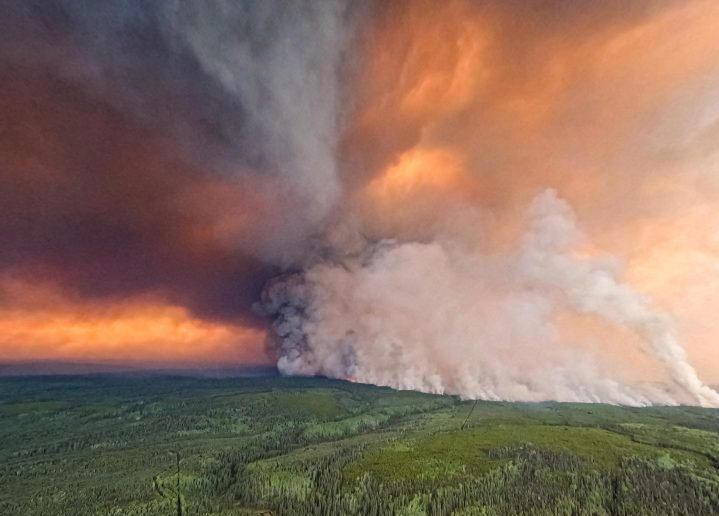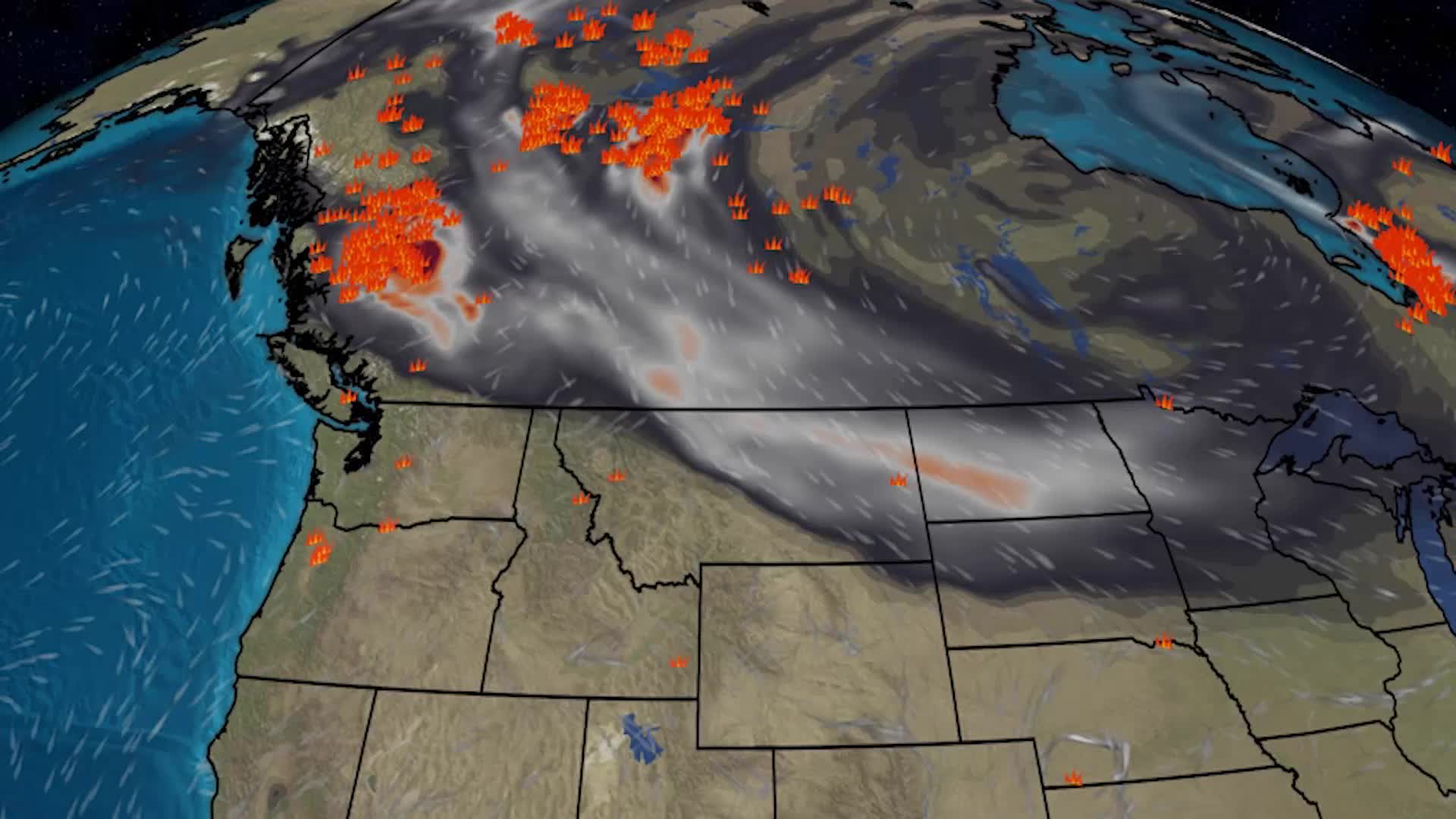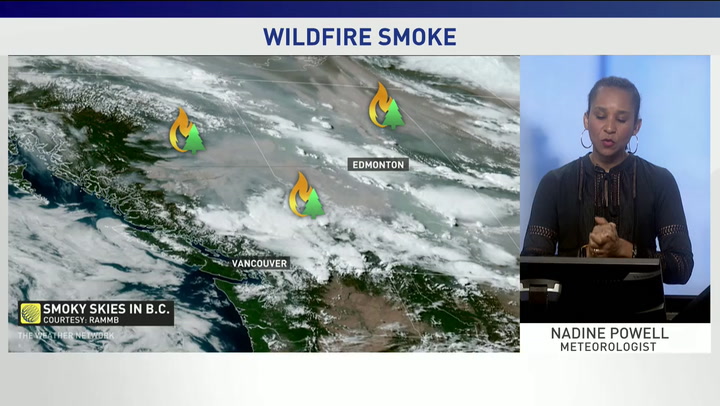First troops in B.C. for wildfire fight, as helicopters and Hercules plane readied
Story by The Canadian Press •

The Canadian Armed Forces says the first troops to help in British Columbia's wildfire fight have arrived in the province, with more soldiers, helicopters and a Hercules plane poised for deployment.
The forces said in a statement that a reconnaissance team is on the ground in Prince George in central B.C. and is working with local authorities including the BC Wildfire Service to strategize.
The arrival of the personnel and equipment will be welcomed by firefighters and communities, said the province's Public Safety Minister Mike Farnworth.
"We also know we can count on the Canadian Armed Forces to be able to assist in terms of a lot of the work that needs to be done," he said.
"While they don't necessarily fight the fires on the front lines, they can provide important work to be able to allow the firefighters to do the work they need to be doing on the ground."
Farnworth said the federal and B.C. governments, including his ministry, the military and the BC Wildfire Service are currently developing a deployment plan "in terms of where is the best place and where the need is required."
The statement issued by the armed forces says that in addition to the reconnaissance team deployed on Sunday, two companies of soldiers from 1 Canadian Mechanized Brigade Group based in Edmonton will be available "to assist and enable firefighting."
"The first company will likely be deploying to the Burns Lake area, at the Northwest Fire Centre, and the second will likely deploy to Vanderhoof, at the Prince George Fire Centre," the statement says.
It says Royal Canadian Air Force aircraft will support firefighting mobility and logistics, as well as emergency evacuations.
The deployment will include two CH-146 Griffon Helicopters from 408 Squadron, and, if needed, a CC-130J Hercules from 8 Wing Trenton.
Defence Minister Anita Anand said the Canadian Coast Guard will also provide two helicopters to transport firefighters and equipment to remote locations and provide supports to remote coastal communities facing restricted access due to wildfires.
Canada's Minister of Public Safety and Emergency Preparedness Bill Blair announced on Friday that military help had been approved after his counterpart in B.C., Bowinn Ma, made a request for federal help amid an eruption of fire activity.
The BC Wildfire Service lists more than 360 wildfires burning in the province, with 23 listed as fires of note, where they are a threat to safety or are especially visible to the public.
Recent data has prompted the federal government and B.C. Premier David Eby to say that Canada and B.C. are on track to record their worst wildfire seasons in 100 years.
Wildfires have consumed more than 12,900 square kilometres of land so far this year in B.C., already nearing the record of just over 13,500 square kilometres set in 2018.
A working group comprised of members of Public Safety Canada, the Canadian Armed Forces, and B.C. emergency management and wildfire officials met over the weekend to focus on deploying the federal resources.
Blair said last week the federal help could include military assistance for airlift evacuations from remote locations, as well as troops trained as firefighters who can "mop up" to keep blazes from reigniting.
Transport Canada, Parks Canada, Public Services and Procurement Canada, and the Royal Canadian Mounted Police are standing by to provide assistance.
Surinderpal Rathor, the mayor of Williams Lake, B.C., said Monday the arrival of the military will serve as a morale boost for firefighters and communities facing the wildfires.
Williams Lake, a community of about 10,000 people in B.C.'s central Interior, was evacuated in July 2017 due to encroaching wildfires.
"They were welcomed by the people, by the organizations, by the community, by the city, by the authorities, and they were the greatest help," Rathor said in an interview on Monday. "It was the best thing that could have ever happened to Williams Lake. Without their help, we would not have been able to survive."
B.C.'s current wildfire situation includes an "aggressive" fire that exploded in size over the weekend and cut off highway access near the Central Coast, while more than a dozen new blazes have been sparked since Sunday, says the BC Wildfire Service.
The service says Highway 20 east of Bella Coola was closed Sunday evening as the fire that was discovered near Young Creek just the day before swelled to 22-square kilometres in size.
The service says no evacuation orders have been issued for the fire.
The Thompson-Nicola Regional District says the Bush Creek East fire near Kamloops is "highly visible," but no evacuation orders or alerts have been issued even as gusty winds have fanned wildfires around the city.
Environment Canada's forecast for Kamloops called for a chance of rain and a risk of thunderstorms on Monday, with many regions in the province under cloudy skies with possible rain on the way, breaking a weeks-long drought.
B.C. has also made a request for 1,000 international firefighters through the Canadian Interagency Forest Fire Centre, which co-ordinates firefighting resources across the country.
Firefighting personnel from the United States, Mexico and New Zealand are already in the province, and teams were set to arrive from Australia over the weekend.
This report by The Canadian Press was first published July 17, 2023.
Dirk Meissner, The Canadian Press
Story by The Canadian Press •

The Canadian Armed Forces says the first troops to help in British Columbia's wildfire fight have arrived in the province, with more soldiers, helicopters and a Hercules plane poised for deployment.
The forces said in a statement that a reconnaissance team is on the ground in Prince George in central B.C. and is working with local authorities including the BC Wildfire Service to strategize.
The arrival of the personnel and equipment will be welcomed by firefighters and communities, said the province's Public Safety Minister Mike Farnworth.
"We also know we can count on the Canadian Armed Forces to be able to assist in terms of a lot of the work that needs to be done," he said.
"While they don't necessarily fight the fires on the front lines, they can provide important work to be able to allow the firefighters to do the work they need to be doing on the ground."
Farnworth said the federal and B.C. governments, including his ministry, the military and the BC Wildfire Service are currently developing a deployment plan "in terms of where is the best place and where the need is required."
The statement issued by the armed forces says that in addition to the reconnaissance team deployed on Sunday, two companies of soldiers from 1 Canadian Mechanized Brigade Group based in Edmonton will be available "to assist and enable firefighting."
"The first company will likely be deploying to the Burns Lake area, at the Northwest Fire Centre, and the second will likely deploy to Vanderhoof, at the Prince George Fire Centre," the statement says.
It says Royal Canadian Air Force aircraft will support firefighting mobility and logistics, as well as emergency evacuations.
The deployment will include two CH-146 Griffon Helicopters from 408 Squadron, and, if needed, a CC-130J Hercules from 8 Wing Trenton.
Defence Minister Anita Anand said the Canadian Coast Guard will also provide two helicopters to transport firefighters and equipment to remote locations and provide supports to remote coastal communities facing restricted access due to wildfires.
Canada's Minister of Public Safety and Emergency Preparedness Bill Blair announced on Friday that military help had been approved after his counterpart in B.C., Bowinn Ma, made a request for federal help amid an eruption of fire activity.
Related video: Canadian Wildfire Smoke Returns This Weekend (The Weather Channel)Duration 0:36
The BC Wildfire Service lists more than 360 wildfires burning in the province, with 23 listed as fires of note, where they are a threat to safety or are especially visible to the public.
Recent data has prompted the federal government and B.C. Premier David Eby to say that Canada and B.C. are on track to record their worst wildfire seasons in 100 years.
Wildfires have consumed more than 12,900 square kilometres of land so far this year in B.C., already nearing the record of just over 13,500 square kilometres set in 2018.
A working group comprised of members of Public Safety Canada, the Canadian Armed Forces, and B.C. emergency management and wildfire officials met over the weekend to focus on deploying the federal resources.
Blair said last week the federal help could include military assistance for airlift evacuations from remote locations, as well as troops trained as firefighters who can "mop up" to keep blazes from reigniting.
Transport Canada, Parks Canada, Public Services and Procurement Canada, and the Royal Canadian Mounted Police are standing by to provide assistance.
Surinderpal Rathor, the mayor of Williams Lake, B.C., said Monday the arrival of the military will serve as a morale boost for firefighters and communities facing the wildfires.
Williams Lake, a community of about 10,000 people in B.C.'s central Interior, was evacuated in July 2017 due to encroaching wildfires.
"They were welcomed by the people, by the organizations, by the community, by the city, by the authorities, and they were the greatest help," Rathor said in an interview on Monday. "It was the best thing that could have ever happened to Williams Lake. Without their help, we would not have been able to survive."
B.C.'s current wildfire situation includes an "aggressive" fire that exploded in size over the weekend and cut off highway access near the Central Coast, while more than a dozen new blazes have been sparked since Sunday, says the BC Wildfire Service.
The service says Highway 20 east of Bella Coola was closed Sunday evening as the fire that was discovered near Young Creek just the day before swelled to 22-square kilometres in size.
The service says no evacuation orders have been issued for the fire.
The Thompson-Nicola Regional District says the Bush Creek East fire near Kamloops is "highly visible," but no evacuation orders or alerts have been issued even as gusty winds have fanned wildfires around the city.
Environment Canada's forecast for Kamloops called for a chance of rain and a risk of thunderstorms on Monday, with many regions in the province under cloudy skies with possible rain on the way, breaking a weeks-long drought.
B.C. has also made a request for 1,000 international firefighters through the Canadian Interagency Forest Fire Centre, which co-ordinates firefighting resources across the country.
Firefighting personnel from the United States, Mexico and New Zealand are already in the province, and teams were set to arrive from Australia over the weekend.
This report by The Canadian Press was first published July 17, 2023.
Dirk Meissner, The Canadian Press
Wildfires have now burned 10M hectares of Canadian land
Story by Aaron D'Andrea • Yesterday

The Donnie Creek wildfire burns in an area between Fort Nelson and Fort St. John, B.C., in this undated handout photo provided by the BC Wildfire Service. Canada has passed a milestone in hectares burned as the worst wildfire season on record continues.
Story by Aaron D'Andrea • Yesterday

The Donnie Creek wildfire burns in an area between Fort Nelson and Fort St. John, B.C., in this undated handout photo provided by the BC Wildfire Service. Canada has passed a milestone in hectares burned as the worst wildfire season on record continues.
© BC Wildfire Service/The Canadian Press
Canadian wildfires so far this year have burned 10 million hectares of land and counting, data from the Canadian Interagency Forest Fire Centre shows.
The stark milestone comes as the nation deals with its worst wildfire season on record, which historically runs between April and September.
The previous record was set in 1989, when 7.6 million hectares were burned.
Officials have warned that in many parts of the country, fire seasons are starting earlier and are becoming longer. Earlier this month, government officials said Canada’s fire season is still far from over, with projections showing potential for higher-than-normal fire activity right across the country throughout the month and into August.
Video: Heat, dry conditions and lightning strikes fuel B.C. wildfire season
Conditions are being driven by drought and above-normal temperatures, officials said in a presentation to reporters on July 6. Fires are burning across the nation, which is also unprecedented, they added.
Canada’s wildfire season has gotten so dire that the country needs an “unprecedented level of international support” to fight them.
“The firefighting effort has now truly become a global effort,” officials said during the presentation.
The government has signed several agreements with nations on wildfire assistance, and recently inked resource-sharing deals with Portugal and the United States.
Emergency Preparedness Minister Bill Blair told reporters on July 6 that much of Canada will remain at high risk for wildfires throughout July, though in August the risk to some areas will decrease.
Blair did not have a figure to provide when it comes to the cost of the wildfire response.
“I want to encourage all Canadians in high-risk areas to look out for one another, to follow the guidance of your local authorities and stay prepared,” he said.
“While there is serious fire risk in several parts of the country, I want to assure Canadians that there are sufficient resources to respond and to keep Canadians safe.”
Canadian wildfires so far this year have burned 10 million hectares of land and counting, data from the Canadian Interagency Forest Fire Centre shows.
The stark milestone comes as the nation deals with its worst wildfire season on record, which historically runs between April and September.
The previous record was set in 1989, when 7.6 million hectares were burned.
Officials have warned that in many parts of the country, fire seasons are starting earlier and are becoming longer. Earlier this month, government officials said Canada’s fire season is still far from over, with projections showing potential for higher-than-normal fire activity right across the country throughout the month and into August.
Video: Heat, dry conditions and lightning strikes fuel B.C. wildfire season
Conditions are being driven by drought and above-normal temperatures, officials said in a presentation to reporters on July 6. Fires are burning across the nation, which is also unprecedented, they added.
Canada’s wildfire season has gotten so dire that the country needs an “unprecedented level of international support” to fight them.
“The firefighting effort has now truly become a global effort,” officials said during the presentation.
The government has signed several agreements with nations on wildfire assistance, and recently inked resource-sharing deals with Portugal and the United States.
Emergency Preparedness Minister Bill Blair told reporters on July 6 that much of Canada will remain at high risk for wildfires throughout July, though in August the risk to some areas will decrease.
Blair did not have a figure to provide when it comes to the cost of the wildfire response.
“I want to encourage all Canadians in high-risk areas to look out for one another, to follow the guidance of your local authorities and stay prepared,” he said.
“While there is serious fire risk in several parts of the country, I want to assure Canadians that there are sufficient resources to respond and to keep Canadians safe.”
Former host of The Nature of Things David Suzuki joins Cross Country Checkup to take your questions about the need for action in the climate change fight, cutting through 'hopeium' and the new normal stemming from wildfire smoke.
Extreme weather a direct consequence of climate change, climatologist says
CBC News: The National
3 days ago
Extreme weather is happening worldwide with floods, tornadoes and heat waves. Experts say it really all comes back to climate change, and it's a race against time to cool down global temperatures and mitigate the effects.
CBC News: The National
3 days ago
Extreme weather is happening worldwide with floods, tornadoes and heat waves. Experts say it really all comes back to climate change, and it's a race against time to cool down global temperatures and mitigate the effects.



No comments:
Post a Comment